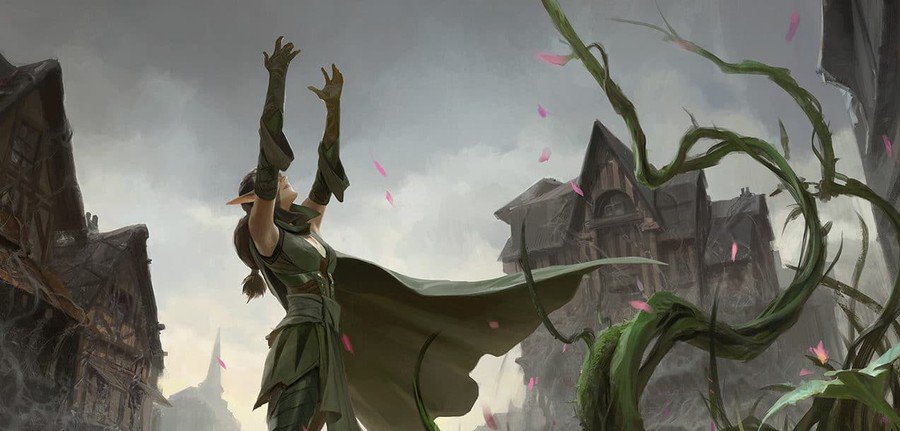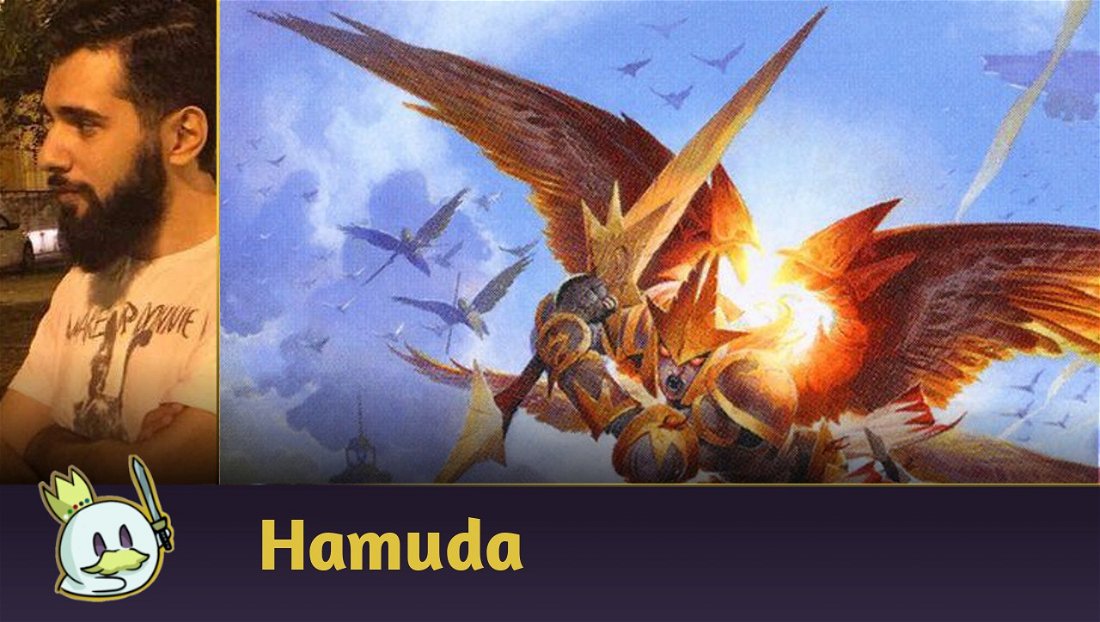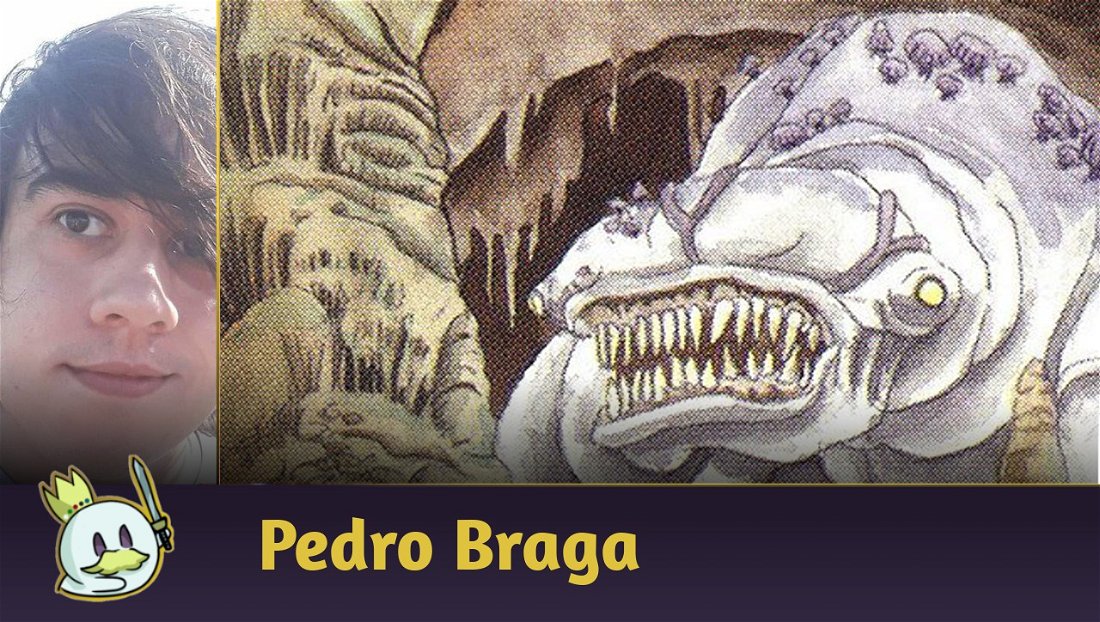Introduction
Cephalid Breakfast

The deck known as "Cephalid Breakfast" was created by Javier Dominguez for the Pro Tour Columbus 2005, having evolved well over the years and continuing to shine in Legacy to this day.
Our proposal is to build a deck oriented from the bottom up, that is, based on the cards that make up the strategy instead of the commander. We can see more about orientation and deck building bases in another article. We're centered around Cephalid Illusionist and Nomads en-Kor combo, which mills the entire library, and we've come to win the game through strong interactions with the graveyard.
Cephalid Breakfast for EDH
The Combo
The interaction between the Cephalid Illusionist and Nomads en-Kor cards allows you to mill three cards each time it occurs. This way:
1. Use Nomads en-Kor's ability targeting Cephalid Illusionist.
(Nomads en-Kor's ability can be used even without any damage.)
2. Cephalid Illusionist's ability will trigger, and you mill 3 cards.
3. Repeat the process until there are no cards left in the deck or as long as you want.
You can mill your entire library as long as you have these two creatures on the battlefield simultaneously.
Cephalids
Only a few of the Cephalids in Torment have this trigger, which narrows our choice to two: Cephalid Aristocrat and Cephalid Illusionist.

Whenever one of these Cephalids becomes the target of a spell or ability, its effects put cards from your library into your Graveyard. We can use a variety of ways to do this.
en-Kor
The en-Kor creatures ability lets you redirect their damage to another creature you control. Their first appearance was in Stronghold and represented their strong sense of community. It was featured in Brian Hacker's White Weenie at the 1998 World Championship and aimed to save the weakest creatures by redirecting the damage to a stronger one that was able to withstand the damage.

All creatures with the name en-Kor have this ability, so they can be used as part of the combo with the cephalids. We opted for Nomads en-Kor and Shaman en-Kor because of their mana cost. One possibility of a non-en-Kor creature is Soltari Guerrillas, which curiously redirects the damage it will deal.
Noncreatures
Shuko was used in the original deck as an option to en-Kor for its mana cost {1} and its equip {0}. In Commander we have more viable options, like Lightning Greaves or Umbral Mantle. Here we've replaced the use of artifacts with the spell Martyrdom, which grants target creature the following ability "{0}: The next 1 damage that would be dealt to target creature, planeswalker, or player this turn is dealt to this creature ".

Finishers
In the original 2005 deck, we had the Sutured Ghoul + Dragon Breath + Reanimate combo as a great finisher, exiling Krosan Cloudscraper and a few other creatures, easily surpassing 20 damage with haste. Naturally, with the release of Dread Return in 2006 and Narcomoeba in 2007, the deck gained much of the consistency it maintains to this day, presenting numerous finishing possibilities. We can consult the various combos with Cephalid Illusionist in the combo search here.
Our version

Once your graveyard becomes your deck, let's go to the next step to winning, which is bringing Archelos, Lagoon Mystic into play with Dread Return, sacrificing Narcomoeba and other creatures to create our wincondition.

Archelos, Lagoon Mystic allows that when using Splendid Reclamation all lands in our graveyard enter the battlefield untapped, so we can generate large amounts of mana or activate their abilities.
1. Perform the Cephalid Breakfast combo;
2. Reanimate Archelos, Lagoon Mystic;
3. Flashback Mystic Retrieval targeting Splendid Reclamation;
4. Cast Splendid Reclamation ;
5. Activate Maze's End and win the game.
The Commander

The commander was chosen based on a few criteria:
1. Access combo colors and winconditions.
2. Recursion.
3. Ability to generate value and card advantage.
4. An alternate victory plan.
Kenrith, the Returned King was chosen for being able to achieve all objectives, being an auxiliary tool in the main strategy and guaranteeing an alternative means of victory. Its many activated abilities can make good use of the large amounts of mana generated in case there is a problem with the main plan.
To amplify its reach during gameplay, we've added cost reducers: Biomancer's Familiar and Zirda, the Dawnwaker — the latter affects all activated abilities including lands.
Alternate wincon
Kenrith, the Returned King is utilized as a Thief / Control tool with Willbreaker, taking control of opponents' creatures and allowing for an aggressive charge, as its first ability grants haste and trample. Another way to win is through Approach of the Second Sun, associated with accelerated card draw.
Packages
Keeping the key cards in mind and the commander selected, here are the cards I decided to complete the deck, based on their roles.
Accelerators

Achieving large amounts of mana is important, given that we end the game when we have our key creatures and 7 more mana available, or by reanimating with the commander's ability.
Lands
We run basic lands combined with gates and tapped tri-lands to build our manabase. Gateway Plaza is a reserve gate to correct the curve and Maze's End which in addition to tutoring the gates is a wincondition.
Protection
The protections package has been divided into combat cheats, active and responsive interactions:
Combat tricks

Archelos, Lagoon Mystic, by tapping opponents' creatures when they come into play, is effective in delaying more aggressive opponents.
The other creatures can be classified into Fogs, combat tricks and walls, creating an interesting interrelationship between them.
Active Interactions

Silence effects are one of the best ways to deal with a possible opponent's offensive, combined with targeted removals we have a diverse package of ways to interact with opponents.
Responsive Interactions

The famous Counterspells. Our answer package tries to create a range of possible interactions to ensure that our win conditions are effective, and we wish to disrupt opponents' plans at critical moments.
Resource generation
This deck generates resources by throwing cards to the graveyard, so for the main self-mill package we have Cephalid Illusionist and Cephalid Aristocrat as main representatives, although other cards also correspond directly to this class.

Draws and Tutors

We opted for a smaller number of direct draw spells to have more space for tutors and various recursions. However, we also used several indirect or triggered draw cards.
Recursions and Graveyard
Rootcoil Creeper and Pull from Eternity allow you to recover cards from exile, something that is extremely important in decks that deal directly with the graveyard. Narcomoeba comes into play when being milled.
Sacred Cat is a sacrifice option for Cabal Therapy and Dread Return.

Upgrades
The natural evolution is to move towards lines even closer to Legacy, which currently runs Thassa's Oracle and Jace, Wielder of Mysteries as wincondition, and exploring cards like Paradigm Shift.
The Mimeoplasm is a great addition if exploring a line of creatures together, and Lord of Extinction or Sewer Nemesis fused with Triskelion are some suggestions.
The most indispensable feature of the format is fun, use creativity and dare. We had a deck tech about a self-mill Commander which can be enriching.
Conclusion
There are many motivations and ways to build decks in Magic, and the ability to mix strategies from different formats is fascinating. The game has a long history and many famous decks that are worth knowing and exploring — Commander is constantly evolving and unraveling the format makes us better players.
Thanks for reading and good games! Any questions, I'm available in the comments!















— 코멘트 0
, 반응 1
첫 댓글을 남겨보세요